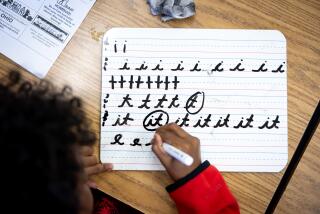The Pen Is Mightier Than the Keyboard
- Share via
If you’ve got mail today, it’s likely to be of the computer-generated variety. Does this mean that handwriting has had it in the ‘90s?
No, say advocates of the handwritten word, who point out that what we write with a pen is a much-appreciated personal touch in an impersonal age--and that, practically speaking, forms, applications and other documents must still be filled out by hand.
Writing by hand is also important, says Valencia graphologist Sheila Lowe, as a way of “allowing you to express who you really are,” much as a pianist or an artist finds expression through music or painting. Lowe works at a computer writing books (including the just-published “The Complete Idiot’s Guide to Handwriting Analysis” from MacMillan) and, she acknowledges, this has made her less patient when she takes pen in hand, “so my handwriting looks a little more scrawly.”
Still, Lowe thinks the computer has done less damage to the art of handwriting than have public school budget cutbacks, which have limited the teaching of what once was called penmanship and have thus deprived children of the self-discipline it instills.
L.A. Unified School District students learn printing in kindergarten and typically learn cursive writing in the next three grades. Wilma Matsumara, a third-grade teacher at Allesandro Elementary School in Silver Lake, teaches cursive writing. While her students are computer literate, she says, they don’t yet have typing skills, so using a computer is “real laborious.”
“In third grade,” she adds, “they’re really excited about learning to do cursive. It’s kind of like being grown up.”
She tells those who may question the necessity of learning to write in the ‘90s that computers don’t sign checks, job applications must often be handwritten and places without computers still exist.
“A lot of people feel that handwriting doesn’t count anymore, but it does count,” says Barbara Getty, author of “Write Now” (Continuing Education Press, Portland State University). “Computers are very impersonal. I have a font of my own handwriting on my computer--I hate to admit this--even so, it’s still impersonal.”
And, she asks, what happens if there’s a power outage and an important paper to be written?
“Hooray for the written word.”
If handwriting is on the endangered list, who is patronizing all those fancy stationery shops? Well, says Chela Pockman, manager of the upscale Signatore in Century City, “maybe 80% of our customers are men. Having one nice pen is sort of stating their status.”
And, at $3,400 for a fountain pen in a Faberge egg pattern, that’s a lot of status. Signatore also sells limited-edition pens to collectors but, Pockman says, “most of the pens we sell people are using. I think people are backlashing” from the coldness of writing by computer.
In the future, the computer and the fountain pen may co-exist peacefully. Lowe mentions an English company that is developing a character recognition fountain pen.
“You plug it into a computer port and it translates what you write into text. You don’t have to lose your ability to do handwriting.”
A final word from Getty: “If someone says handwriting is no longer important, ask that person to go 48 hours without picking up a pen.”


